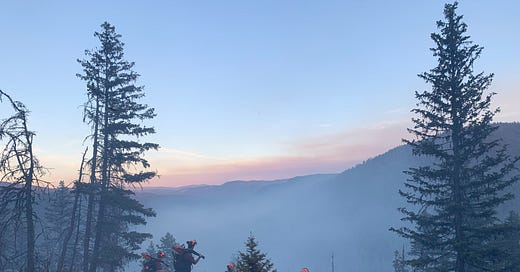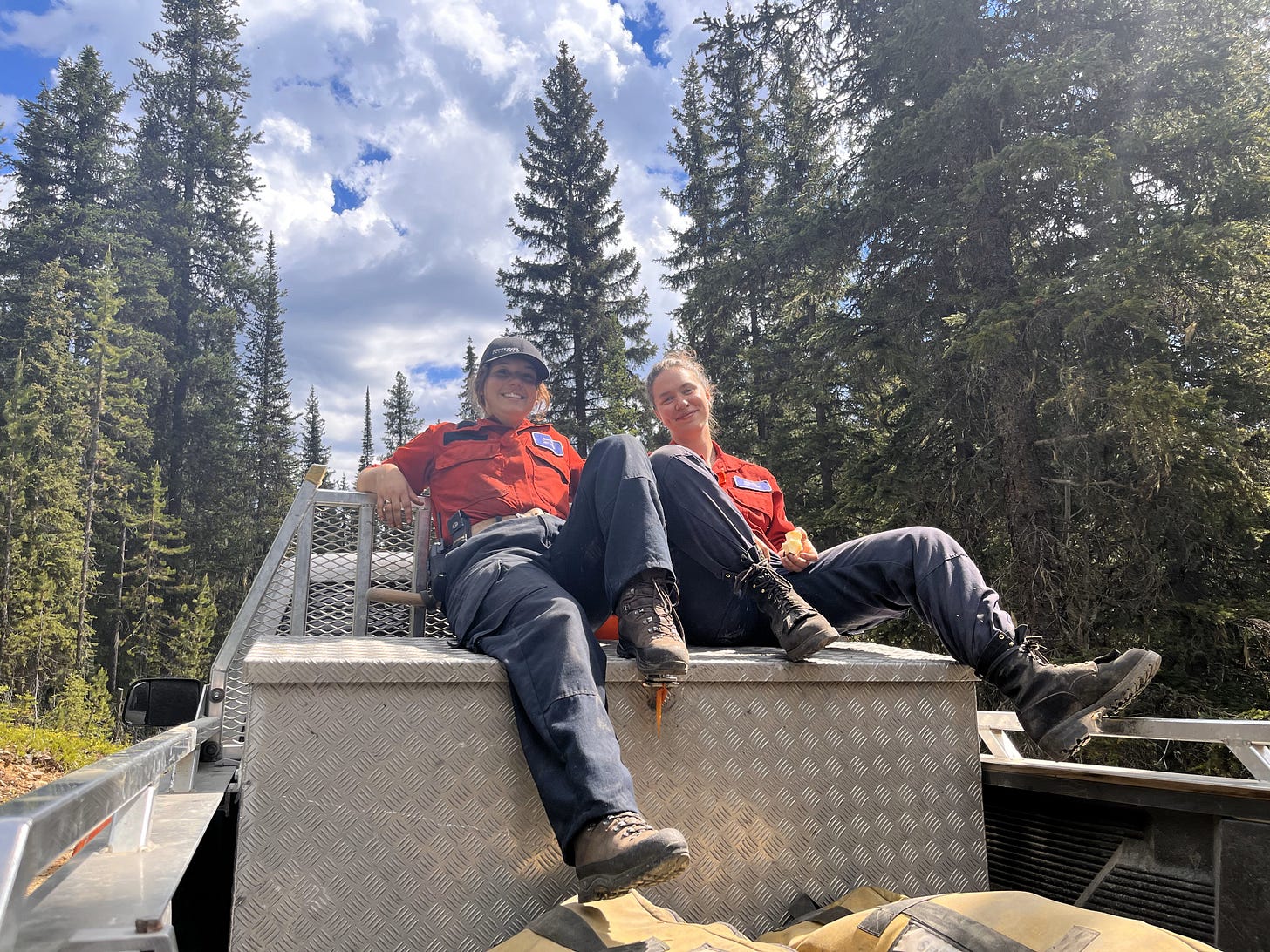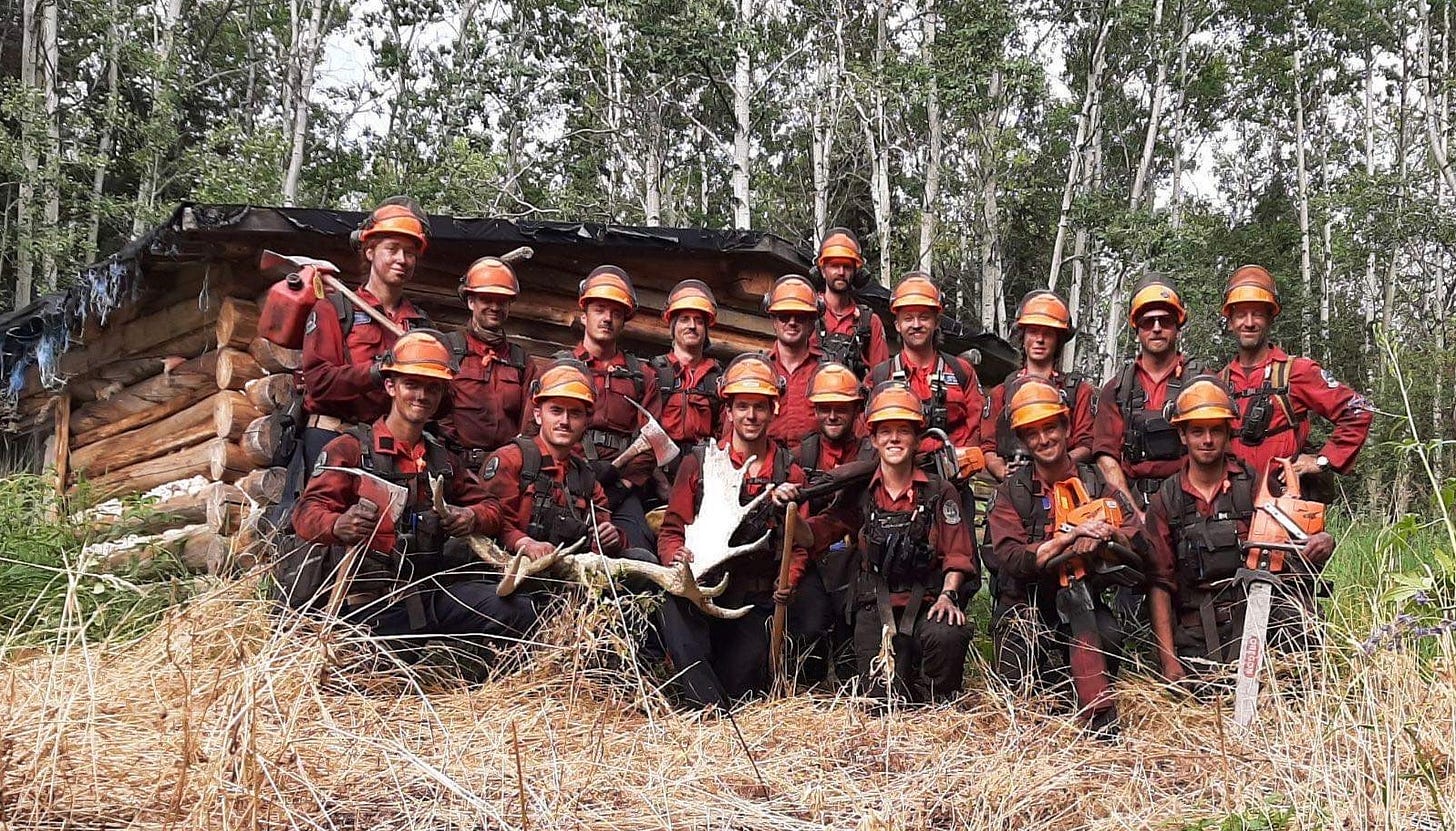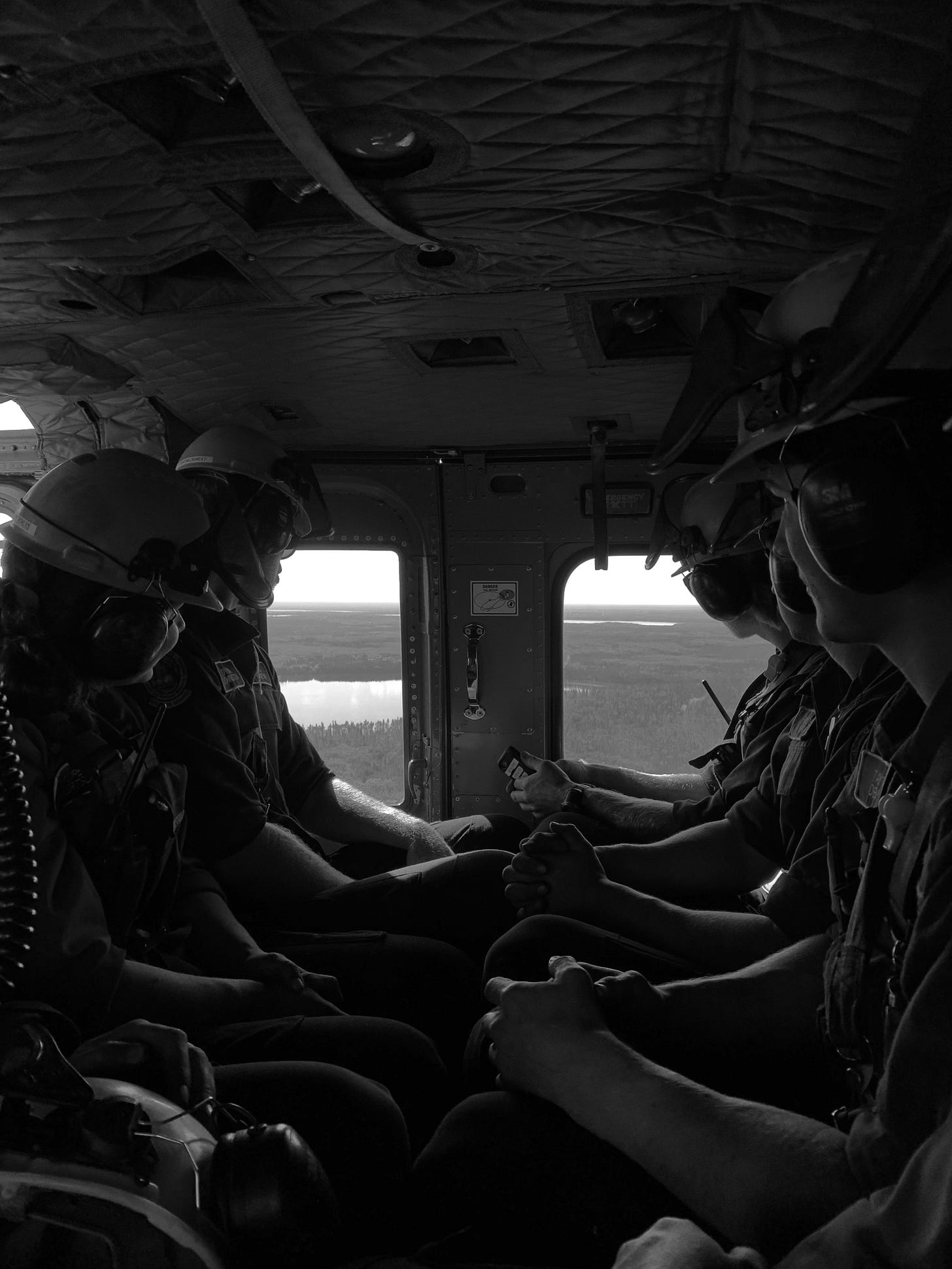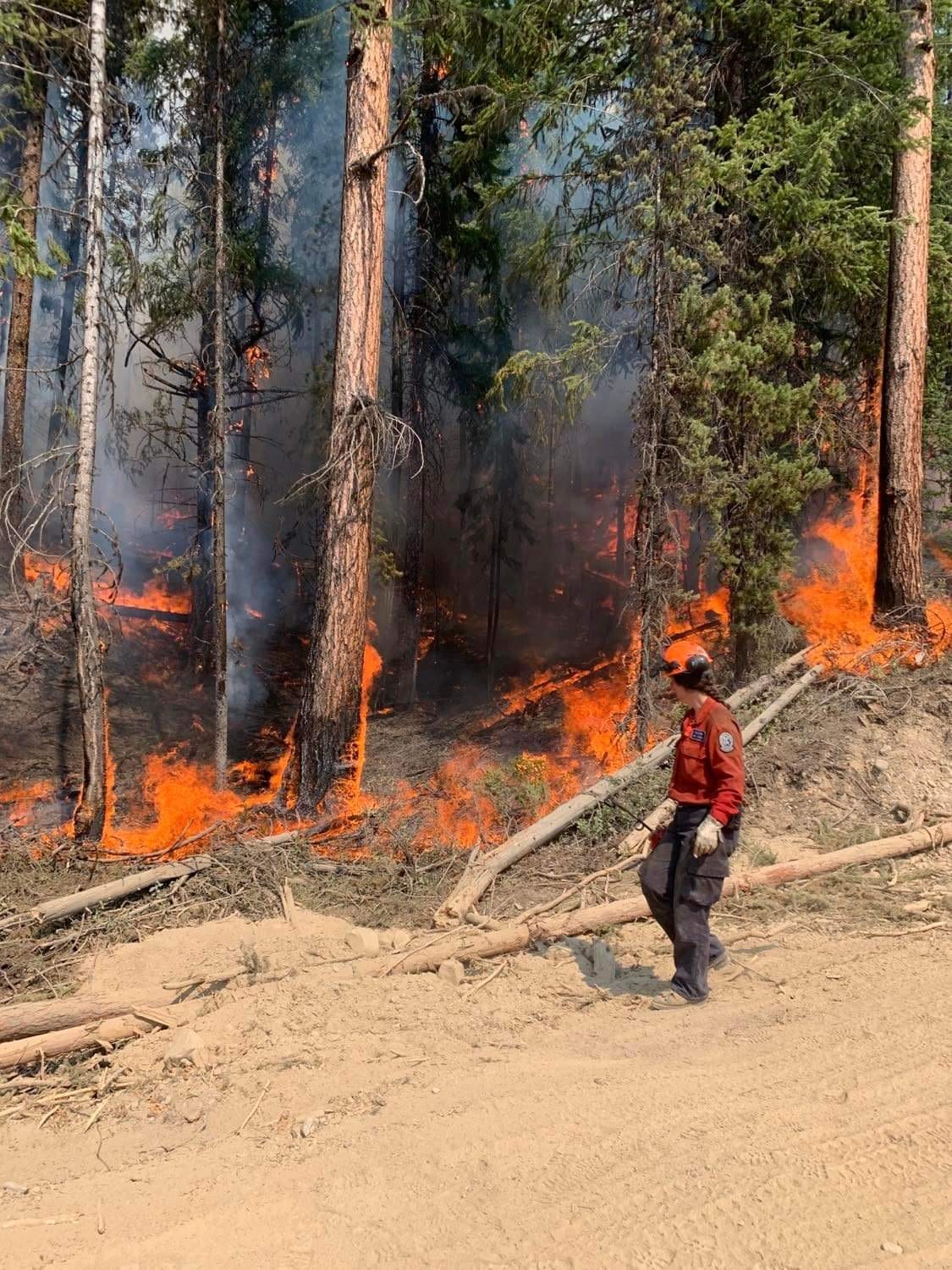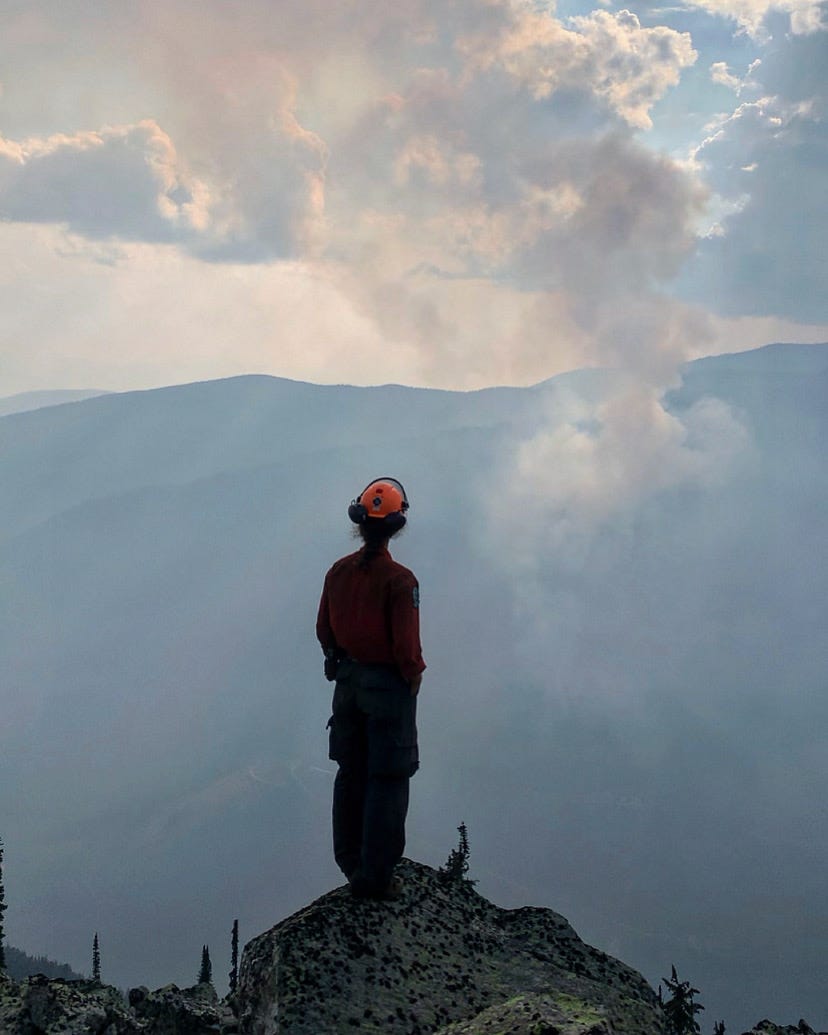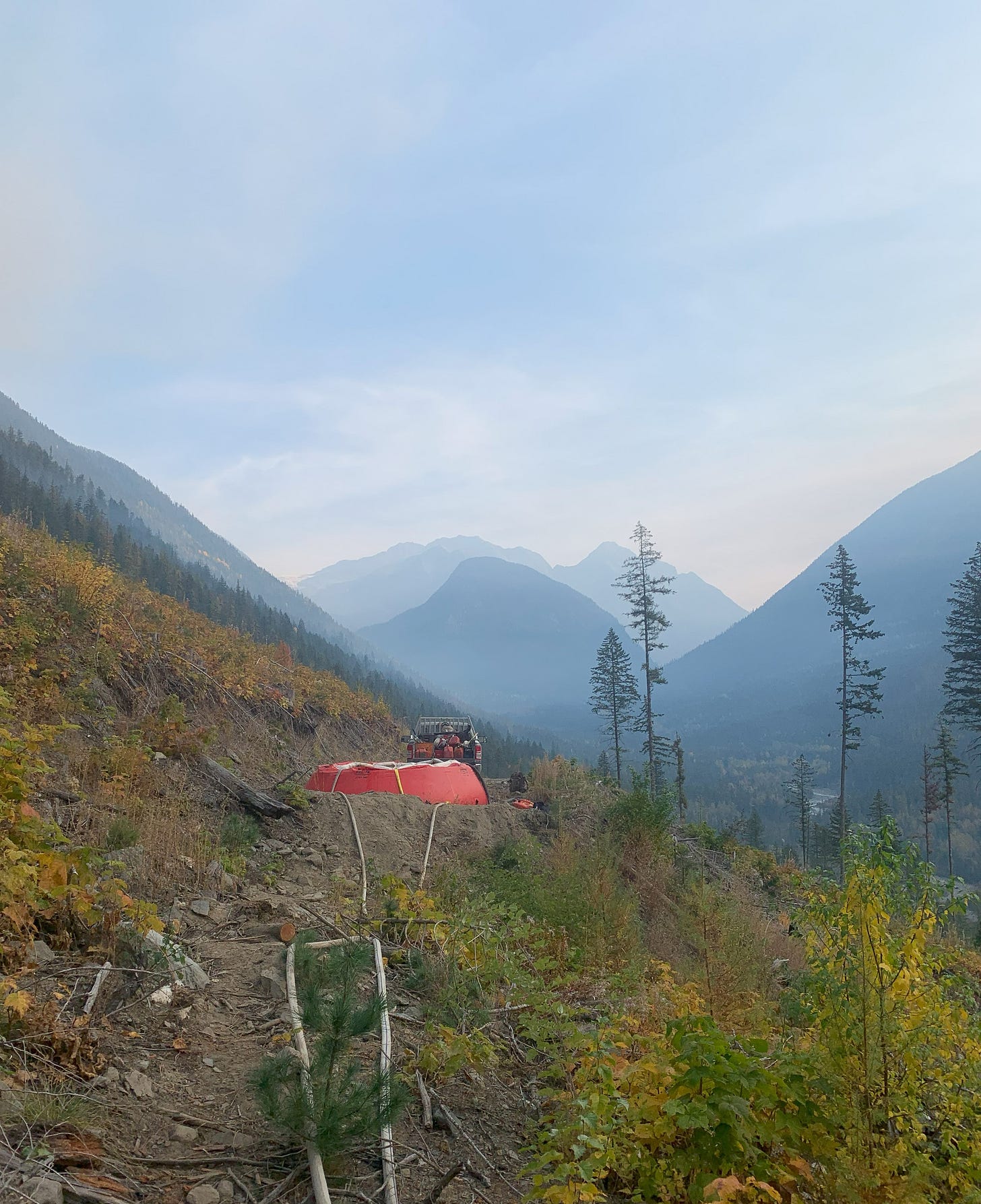If I could describe the 2022 season of wildfire in a couple words, they would be “discovery” for learning the limit of what I have energy for, and “steep” — other than the first deployment, the fires we were on burnt on ground that strains calves and strengthens quads. After a winter of doing absolutely nothing, I felt well-rested and eager to return; my body was ready to do it all over again. But the flavour changed as the season progressed, my energy and will soured and my eagerness for the hard work dwindled to an single ember I had to keep blowing on to keep burning.
*The following essay is chronologially interwoven with written memories of deployments and sections of journal entries from between fires.
March 15
We’ve been doing some burn prep at Deer Park […] which is quite fun. Monday we spent a day putting in a beefy hosetrail whih was a great reminder.
It took about 20 minutes and one length of the hose trail we were establishing for my forearm, back and leg muscles to remember what this kind of work was. It took a little bit longer for my bush legs to balance out as well, but by the end of my first length of trail, I was stoked for the objective. […] At the bottom of the hose trail just above the lake, the whine of chainsaws was replaced by wind in the ponderosa tops and waves lapping at the bleached and exposed rocks of the Arrow. Rakes and Pulaskis clanked against the steep rock slope, mostly moving rock around instead of leaf and needle litter. […] Walking back up that hill was like a trip down memory lane, the memory of last summer and the lane the well-dug hose trail. My breath came short and fast, my thighs strained, my calves cramped; the arrival at the top felt like returning home.
Duck Lake Fire, Northeastern Alberta, July 20 - August 2
We arrived in the middle of a series of rainstorms that, inevitably, put the fire out for us. The crew trucks slid and skidded between the camp and the small air strip for days afterwards, the road becoming two single rutted tracks in the gray clay of the great northern boreal forest. When my squad touched down in the muskeg on our first day out, water oozing over the tops of our boots, something, oddly, felt familiar. As the helicopter spun back up into the vast, blue sky, I took in the vibrant tableau of red shirts amongst the spongy green and felt a deja-vu descend over me – I’d seen these trees and the colours and felt this ground beneath my feet before.
Those days in Alberta were slow ones; it became a crew-building deployment, where the connections that formed between us were like the mud that stuck fast to everything once it dried. We shared different methods of defense against the mosquitoes, some of us wrapping ourselves in rain layers, succumbing to their whine, while others twitched spruce boughs over their shoulders. A crew mate and I, in search of water one day for a hot spot, dug down to the icy layer of clay and smeared the cold earth over our bare arms.
I knew the season would pick up pace when we returned home, so I lapped up the unusual scenery and savoured the texture and smell of the landscape. The short work days allowed time to observe the surroundings; my notebook filled with sentences trying to describe the sky, the trees, the ground, the moments of camaraderie:
Black spruce standing like seaweed on the ocean floor, like they are pulled on both ends, stretched taught between gravity and the lure of space.
A dense humidity coating us with a sweat that soaked shirt collars and breached the barricade of our eyebrows.
The Delta squad rookie blasting Viking music to wake us up in the morning.
The muddy prints of bear paws painted onto the hoods and roofs of crew cabs.
Eating last night’s leftover steak dunked in packaged mustard with hands the colour of ash.
A lightning bust darkening the sky to the North as we prepared to fly out at the end of the day, white forks striking the linear landscape.
Bravo squad cracking cold cans of Pipeline Punch at 14:00 in remembrance of the previous season.
Trees so tight and densely packed together we had to haul each other through when our linepacks got in the way.
A can of wintergreen, artfully placed in my red shirt pocket to look like I chewed but in reality, I was brought to my knees with nausea every time I did.
The Duck Lake cabin in a small clearing ringed with shimmering aspens, the crew posing for a photo.
On the last day, the incident command team put on a talent show to thank us. As we trudged around in our last attempt to find hot spots, I abused everyone’s ears as I practiced a Corb Lund song about cows; when I stood up to sing, my face burned crimson at the ill-sounding tune coming out of my mouth. My squad’s rookie showed off his flips, someone on the other crew juggled Pulaskis and a trio of ladies lip synced to Britney Spears. In the end I got a first place Alberta Wildfire patch and was recognized as the “cows around” girl whenever I worked with the other crew. As we drove back home through the rolling hills of Alberta and the blue glaciers of the Rockies, something inside told me to hold onto those two weeks with a tight grip.
August 3
What serenity there was arriving to a family farm throbbing with childhood memory, a slow and docile heartbeat, and the lush deliciousness of mid-summer health. […] Although I may have awoken this morning with the remnants of fire camp anxiety, it has not taken long to succumb to the heady weight of rest and recovery in this nook. Oh sweet home.
Connell Creek Complex, August 9 - August 22
It was that time of the summer when the air was hot and dry; any vegetation that had held onto greenery now stood crispy and browned. Our camp was a short walk from the Elk River and after stuffing our faces with dinner, we slung towels over our shoulders and stripped down to our underwear for a refreshing dip. The first time I dove in, I felt my body drink in the cool water.
Our time in the East Kootenays was halved between a modified response fire crouching on a steep slope in a narrow valley (above image) and a bigger project fire that burnt on the low-slung mountains towards the US border. It was the kind of deployment that never really found a rhythm — although it was common for the daily objective to change — and once we were placed on the second fire, our location changed everyday. We were kept on our toes.
It was also the deployment I once again held a drip torch. Since my accident earlier that season where I had sustained second degree burns while using a one, I had, consciously or not, stayed away from it. At the briefing on our third to last morning, however, that was changed when my name was added to the list of burners. My heart lodged itself in my throat. It was a hot and dusty day, the sun beating down on the open fire guard. By the time we started burning, around two in the afternoon, and although I had been diligent with my water intake, a headache pulsed behind my eyes.
The fire took quickly in the pine stand, trees roaring to life, the heat immediatlely drying the sweat beading on my forehead. Although I had felt apprehensive, it felt good to have a torch in my hand, and when the burning was finished, I had a big goofy smile on my face.
Later, however, after a few hours of hosing in constant smoke, I wasn’t smiling. As a crew mate and I walked back to the trucks, my knees gave out and I sat amongst the gear I carried with head bowed, my heart racing and vision swimming. When I made it to the truck, I collapsed on the backseat and stayed there through the debriefing, sliding in and out of consciousness. I felt sick, hot, dry, and used up. My crew leader diagnosed me with heat exhaustion the next morning and I spent the day in the truck, feeling guilty and sorry for myself.
I often felt sorry for myself towards the end of that second deployment; I was beginning to feel the wear of doing for others and not myself. There were a few nights where I would cry alone in my tent, tears pouring down my cheeks, feeling self-conscious about the loudness of blowing my nose. Although I was surrounded by people all day and all night, those were the times when I felt the most alone; I felt that, if I were to express myself, I wouldn’t be understood.
On our drive home, I sullenly sat in the back, tuning out my crew mates chatter with loud music in my ear buds. I feverishly looked into fire lookout jobs or getting on with a crew in Alberta — somehow, in those moments, I felt a change would fix things.
August 21
I am full of tears. I found horses. I am very ready to go home to the wilds.
Between Fires
The extra time we were given between deployments felt odd — there were big fires happening in other areas of the province yet we stayed “in the barn” scrounging up odd tasks to fill the days with. One such task was patrolling and demobilizing (taking gear off the fire) a small fire just north of Slocan. This was the kind of terrain one would never want to work in: a highway cuts into a sheer rock face, and below the road, about two hundred metres down, is Slocan Lake, deep and impenetrable. The fire, sneaky thing that it is, was between the highway and the lake, wedged between rockslides and rock bluffs.
The patrolling bit wasn’t too tedious, but dragging the hoses out was. It’s one thing dragging eight to ten hoses off of any fire, but pair that with the giant marbles of rock that catch and hook a coupling, this was a job that inspired frusturation, not excitement. But we did it nonetheless, and when it was done, I felt elated — my calves burned, sweat dripped into my eyes and my lungs heaved.
August 30
We hit up Rockslide lake as a crew and the whole hike in and out I felt top heavy, not even sure of where my feet were landing and how my lower body was moving so automatically. I was so savagely dissociated and […] LOST.
Wallace Creek/Six Mile fires, September 3 - September 16
As I was walking towards a coffee shop to meet a friend from the crew, I got a call from my squad boss — the crew had a fire. By the time I got to base, I could feel the familiar tightness of anxiety in my diaphragm, and, as we rolled up the dusty road to staging four hours later, I was ready to fling myself out of the moving truck.
During our first week out, we hiked the steep grassy slopes outside of Greenwood, trying to contain a hungry fire. There were good moments, and there were bad. I was told to do things one way and did them my own. My phone fell out of my pocket as I tried to save three sections of hose and I couldn’t find it. I cared little for hosing and on one occasion, the crew supervisor walked by, telling me I’d missed a spot and I said “I know”; his look was incredulous before he moved on. But the good came with pump duty for a few days, and oh, did I love that. There was nothing but me and my canned peaches, a good view, and learning how to befriend something I was terrified of.
The day of my birthday, we arrived at our second fire, crackling away on the thick spruce hills of a narrow valley north of Nelson. I got out of the truck with a nosebleed and tears streaming down my face (why was I always crying?) — at one point a crew member asked me why, on my birthday, did I looked so “miserable”. I only shrugged and readjusted the tampon in my nose.
I spent one day as lookout across the valley, perched atop a hill that had experienced its own fire seven years previously. The crews on the ground were burning that day, and I sat, completely separated except for my radio, watching smoke billow up and keeping tabs on the weather and wind patterns as the day progressed. It finally felt like my lungs could expand with full breath, that I wasn’t holding onto something to remain upright; I was still part of it, but I was alone, and I relished in it. At the end of the day, I got a heli ride of the perimeter of the fire with the incident commander. The sun glowed orange in the sky, thick smoke choked the carpet of spruce below and I felt my chest twinge with something longing, something letting go — this wasn’t my place anymore.
The end came with rain. On the second to last day I babysat the pumps in a steep creek draw. The day was slow, it was only the edge of the fire that needed cleaning up now. I read Annie Dillard; I stared off at the spot I’d perched upon a few days earlier; I watched the rain-bathed hemlock boughs glisten like honey in the sun; I wrote about rain:
The earth is heavy with rain; it has become so saturated each tendril of moss, each needle upon branch, layer of bark on tree trunk trembles impregnated with water last tasted weeks ago. It has me grinning like an over-stimulated first day first grader — each drop that falls on my face I feel in my fingertips, my toes, my pelvis, my chest. [At this time of the season,] I find rain more welcome than a meal.
September 12
It’s crazy how one can have a wonderful, on-point, maybe even flawless and incredibly “vibey” day, and then one thing sends you into a downward spiral. Gosh, I cannot even describe in words how finished I am with fire-fighting and this crew. It’s like my chest doesn’t fully expand with breath when I think about another day, MORE days.
Dread. A yawning sense of dread that fills the chest cavity. Yet it's sitting side by side with love though, they’re hand in hand; like there’s dread for the rest of the season with these guys, but there’s also love for them.
And there is a budding rage with where I am and how I need to continue this job but deeper things are telling me I’m done. Because I AM done. I’m well and truly done.
Winlaw Creek fire, October 7
Short, dirty, quick — on our way back from a project in Nakusp, four of us were called to help a crew from base on a fire that had popped up above Winlaw. A cold was beginning to settle its moist body in my sinuses, my body felt weak and unable to sustain fast movement. My childhood friend, also a crew leader and a Level Three medical aid, handed me a magic mixture of pain killers and off I went. I don’t think I had moved that fast since the beginning of the season.
October 8
[…] this sickness, I realize is a reflection of the end of season [and] fire burnout. But for some reason, I don’t know how to relax into [it] and allow it to run its course; my ability to slow down has been apprehended by the going, going, going of fire-fighting. […] Change and moving on is leadening the air and everything truly feels as it should, in its own way. I suppose even this cold-thing accounts for something.
Glacier Creek fire, October 19 - October 21
Just when we thought it was all over, the remainder of the crew was split up and sent to two stubborn fires during our last week of contract. This was when I decided I’d had enough; I checked out. I already knew I wasn’t returning to the crew — I’d sent in my transfer request the week before. I was certain a change would help the way I was feeling: stuck.
The fire was another steep one, located on an FSR that led into the Purcells. It wasn’t a nice fire: the slashblock it had crept into made moving awkward and besides that, the pitch of the slope wasn’t something to smile about. On the second day, I made a rookie mistake and forgot my spare battery in my motel room. I was also on pump and kicker duty, which required radio connection, and I was lucky to have a truck radio nearby. But the crew supervisor’s passive comment changed my mood for the rest of the day. I hiked up to borrow a spare battery from someone, and, instead of taking the pre-cut hose trail, I decided to cut through the block, and what an awful mistake that was; this was not the kind of cut block you want to take a stroll in, let alone hike up. I cried with frusturation on the way back down.
But it got better (worse): on the third and last day we demob-ed, and again, my choices in direction were poor. I’d had one last oomph of motivation to show I was still engaged and took twelve hoses; instead of cutting down like everyone else did, I took the hose trail. Of course I got stuck every two metres, of course I hot-micced (pressed the talk button on the radio) every two feet. Again, hot tears rolled down my cheeks and I swore in frusturation everytime a hose caught. I angrily rolled my hose away from everyone else and sat in the back on the two and a half hour drive home.
October 22
I’m in one of those holes that can be found at the end of a hard season, a hard time, a hard run. It felt very odd returning to work after eight days of sickness and healing solely to myself; actually, I noticed how done my body really was with how quickly fatigue and irritation and frustration flooded back in. Granted, that official last week was leading up to my period and everything felt accentuated anyway. And of course fire season wouldn’t let us go: we spent [the last] three days out of Nelson climbing slash blocks and watching smoke choke the steep valley towards the Purcells. I didn’t quite realize how checked-out of the job I was until one mishap – radio dead on pump and kicker duty – and although I am fully aware of how to treat a fireline day, I was no longer present; it was just my physical body going through the motions. Friday, demob day, rolled around and I sped around base completing my tasks. I wanted out so bad I left at noon. My period came four hours later. ENDINGS.
*End note: I’m begining to feel a book coming out of these pieces — there is just so much to put down into words, so many moments that require the attention and detail of chapters. My dear mother proof read this piece (she is my trusty editor) and validated this feeling by telling me that she, as the reader, wants to know more.

